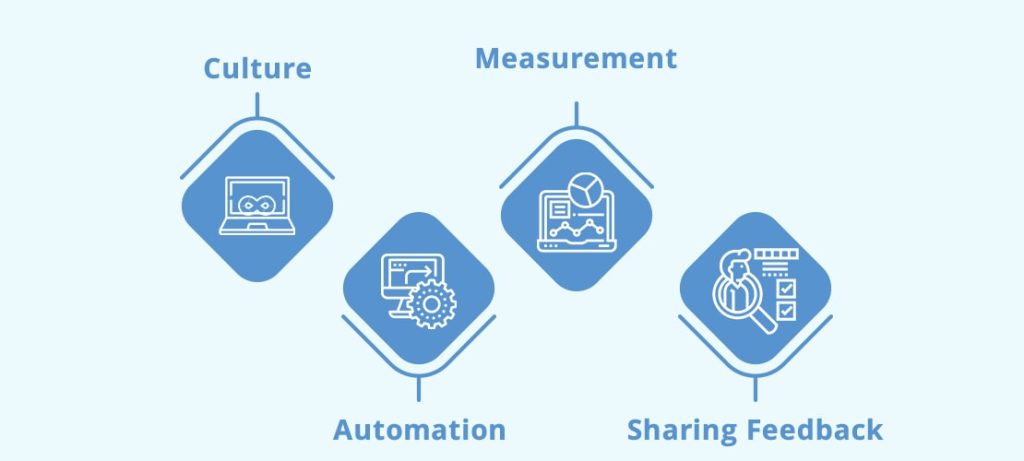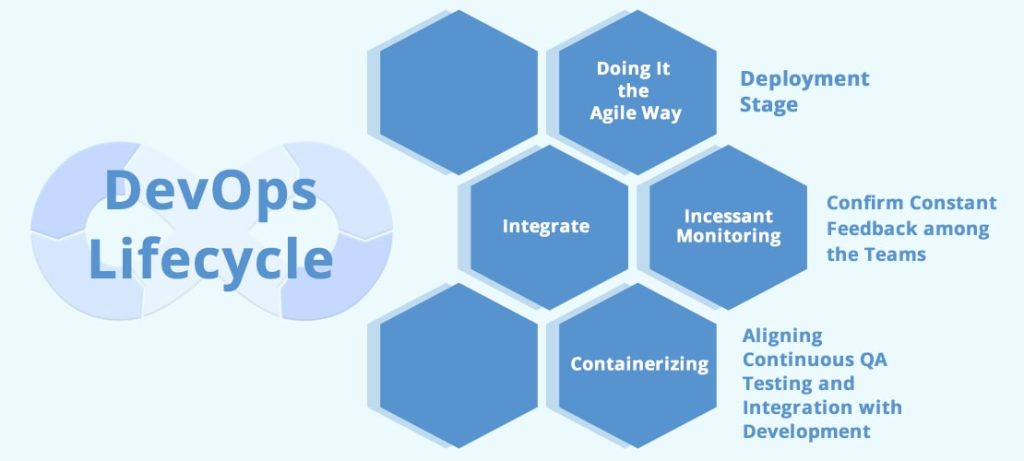In today’s digitized world, each and every organization dealing with software development processes seek ways for optimizing this whole process as it has become a costly affair to deliver more robust products than the opponents. This is where DevOps practices come into the picture as they can help in this regard. Although the Waterfall development model existed, development as well as operations were actually separated from the lifecycle of software development. And today, with these agile methodologies having amplified iterations & deployments rounds, this new DevOps approach has somewhat become quite essential.
Statistics Speak
As per a recent study of over 25 thousand technical professionals, most high-performing firms tend to deploy two hundred times more effectively as well as frequently while using DevOps, with around 2555 times quicker leads’ times. Though DevOps as well as change management are not always that easy, but with the correct set-up of this particular process, it is possible to augment IT performances, while at the same time, reducing organizational IT costs, which in turn lead to amazing business results. Thus, the need for DevOps services has increased considerably.
Best Ways to Implement DevOps Effectively

The DevOps principles are best described by the CAMS model, and the core objectives outlined were to bring about automation for improved efficiency, product improvement via continuous feedback, and ensuring quick delivery. Let’s further understand the CAMS model:
- Culture: DevOps is all about closely knitting the strings of communication, tools, and technical processes together.
- Automation: All processes to be streamlined and accounted for via automation.
- Measurement: KPIs need to be measured and scrutinized at all times.
- Sharing Feedback: Use of best practices for development via the sharing of feedback for continuous improvement.
Related Reading – 8 DevOps Trends Predicted for 2020
Steps in the DevOps Lifecycle

With the objective of continuous delivery at its core, the DevOps deployment approach merges development, QC testing, and deployment to streamline the entire delivery process. Before DevOps Deployment, it is important to understand the process stages that are needed to be set up and also getting on-board the tools that are needed for its seamless integration into your business processes effectively.
Doing It the Agile Way
You can increase the number of releases by implementing careful Agile planning to organize your entire automation work into small iterations known as sprints. You can definitely look to increase the performance of DevOps services manifold only to reap huge dividends on your investments.
Integrate CI/CD tools for Infrastructure Automation
DevOps require careful management of containerized applications where it is assumed that software is distributed into different containers. For this stage, the most common tools used include Ansible, Puppet, Chef, and Kubernetes. For the best configuration management and application deployment, these can easily be integrated with CI/CD tools such as Bamboo, GoCD, and Jenkins. Once continuous integration is achieved, DevOps services are bound to run smoothly.
Aligning Continuous QA Testing and Integration with Development
One must ensure adequate automated QC testing in order to expedite DevOps delivery. While a committed code is generated by the QC team, one can get to know about any of the vulnerabilities or any bugs during the QC process, which can be readily sent back to the engineering team for fixing them. Here, version control plays an important role in detecting and identifying problems with integration in advance. The tools for this that are mostly handy include Ranorex, UFT, GitLab CI, Selenium, TeamCity, and Bamboo. It is always good to avail DevOps consulting services from a viable DevOps consulting service provider.
Containerizing
Docker is a well-known tool for identifying and compartmentalizing issues in different application containers during the process of development. This tool is especially handy when you move the software from testing servers into production. Thus, the isolated containers from the entire IT infrastructure have a better chance of running with absolute stability. That’s where the process of containerizing is a very important aspect of DevOps infra management. Thus, reaching out to any good DevOps consulting companies would be a wise decision.
Deployment Stage
This stage involves deploying and running the code on a public server in a production environment. Any code for features must be deployed in a way to not interfere with any already deployed and well-functioning features of the software. This way, the newly deployed features are subjected to real-time testing and early verification by end-users and follow a “fail fast” approach. Some of the tools that could possibly be used here for deployment are Chef, Puppet, etc.
Incessant Monitoring
With several monitoring tools, DevOps has become simpler. The goal is to detect the problem areas of the specific process. One more thing here is to analyze the feedback received from internal teams and also the feedback taken from the users to tackle the inaccuracies if any! A critical part of such a process is the automation tools, which work towards facilitating the workflow like Nagios, Prometheus, or Zabbix. It is high time you must check with the best available DevOps service providers for Cloud DevOps consulting.
Confirm Constant Feedback among the Teams
For spotting any gaps, any type of issues, and any sort of inefficiencies, feedback loops are needed for automating communication among tests, which allows every person in the teams to give in their respective feedback, and as such the product would become better for it. It is also needed that the entire firm is on the same page with the company’s DevOps goals as well as DevOps objectives.
Also Read – DevSecOps – Incorporating The 10 Best Security Practices Of The Industry
With the steps mentioned above, it is possible to make the DevOps integration process smoother and to manage the said approach in a more effective way. Well! A lot of effort as well as resources are consumed for proper DevOps implementation and use, but once done; the returns are amazing and fast! With a very proactive staff to assist you all through, AddWeb Solution, one of the best DevOps service providers, provides you with an entire gamut of DevOps consulting services and DevOps solutions, which include DevOps managed services, cloud DevOps consulting services, and DevOps consulting business services, etc.
Frequently Asked Questions
DevOps promotes collaboration between development and operations teams, automates repetitive tasks, and emphasizes continuous integration and delivery. This results in shorter development cycles, faster deployment, and quicker response to changing business requirements.
Key principles include automation, collaboration, continuous integration, continuous delivery, and monitoring. These principles ensure a seamless and efficient development process, enabling teams to deliver high-quality software with speed and reliability.
Automation is a cornerstone of DevOps, reducing manual errors and accelerating processes. It involves automating code deployment, testing, and infrastructure provisioning. This allows teams to focus on higher-value tasks, enhancing efficiency and consistency.
Continuous integration involves frequently merging code changes into a shared repository. This practice ensures that code changes are automatically tested, helping identify and address integration issues early in the development process and promoting code quality and stability.
Continuous delivery extends the principles of continuous integration by automating the entire software release process. It ensures that code changes are always in a deployable state, allowing for more frequent and reliable releases.
Monitoring is essential for identifying issues in real time, analyzing system performance, and making data-driven decisions. It allows teams to detect and address issues proactively, ensuring the reliability and optimal performance of the software.
Implementing a DevOps culture involves fostering collaboration, providing training, promoting automation, and emphasizing shared responsibility. Leadership support, clear communication, and a focus on continuous improvement are key to cultivating a DevOps mindset.
